Resources
Resources, Primary (Science, Maths), Secondary (Science, Maths)
Relevant resources
| Algebra | What's Possible? | |

|
Many numbers can be expressed as the difference of two perfect squares. What do you notice about the numbers you CANNOT make? This lesson idea is about exploring and noticing structure(ta).
The collection of NRICH activities are designed to develop students capacity to work as a mathematician. Exploring, questioning, working systematically, visualising, conjecturing, explaining, generalising, justifying, proving are all at the heart of mathematical thinking. This particular resource has been adapted from an original NRICH resource. NRICH promotes the learning of mathematics through problem solving. NRICH provides engaging problems, linked to the curriculum, with support for teachers in the classroom. Working on these problems will introduce students to key mathematical process skills. They offer students an opportunity to learn by exploring, noticing structure and discussing their insights, which in turn can lead to conjecturing, explaining, generalising, convincing and proof. The Teachers’ Notes provided focus on the pedagogical implications of teaching a curriculum that aims to provoke mathematical thinking. They assume that teachers will aim to do for students only what they cannot yet do for themselves. As a teacher, consider how this particular lesson idea can provoke mathematical thinking. How can you support students' exploration? How can you support conjecturing, explaining, generalising, convincing and proof?. | |
| Area | Circles, frustums and cylinders revision | |

|
Measure the volumes of objects This resource offer students the opportunity to engage in active learning(ta) - measuring and calculating using large size cylinders and frustums. This lesson brings great opportunity for small group "dialogic teaching(ta)". Open-ended and closed questioning(ta) of students can be used to draw on their existing knowledge and extend their understanding. The teacher provides a practical commentary below.
| |
| Assessment | Diagnostic Questions in Maths Teaching | |

|
Using questions to probe what pupils do, and do not, understand These questions provide a useful starting point from which to think about the use of diagnostic questions(ta) for assessment(ta) for learning and whole class(ta) dialogic teaching(ta). They may be useful for teachers in their own right as sample questions, or to think about the best way to deliver feedback, use ICT tools effectively, and support learners through assessment. In this context the questions should be considered with a critical eye. Teachers might like to think about:
Teachers might take this as an opportunity to engage in sharing practice(ta) to think about how to use such questions in the classroom - perhaps using mini-whiteboards(tool) or ICT tools - and outside of them, perhaps using quiz(tool) or voting(tool) software. | |
| Assessment | Assessment for Learning | |

|
Research shows that good practice in assessment for learning can bring about significant gains in pupil attainment Assessment for learning has been defined as the process of interpreting evidence to decide where learners are in their learning, where they need to go and how best to get there. When assessment(ta) for learning is well established in a classroom, pupils are actively involved in their learning; able to judge the success of their work and to take responsibility for their own progress.
For some shorter more focused documents drawn from this DfES document see Giving Oral Feedback, Giving Written Feedback, Sharing Learning Objectives and Outcomes. | |
| Assessment | Using Assessment to Raise Achievement in Maths | |

|
Learning goals; self & peer assessment; effecting questioning; marking and case studies This resource explores approaches to assessment(ta) in maths, including the sharing of learning objectives(ta), group work(ta), whole class(ta) assessment, questioning(ta) and more. Four case studies serve as useful discussion prompts to share practice(ta). This .doc version of the QCA's 'Using assessment(ta) to Raise Achievement in Maths' allows schools to select parts of the document that are most relevant to them.
| |
| Assessment | Changing KS3 Questions for Engaging Assessment | |
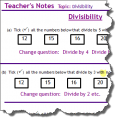
|
A large set of questions grouped by topic, paper, and national curriculum level Test questions are often seen as uninteresting and useful only to assess pupils summatively. This resource however allows questioning(ta) to be used to support pupils’ revision, creativity and higher order(ta) problem-solving in class. The tasks could be conducted via whole class(ta) discussion(ta) or assessment(ta), perhaps using mini-whiteboards(tool), or in small group work(ta) situations.
| |
| Astronomy | Stars in the sky: what's up? | |

|
Use a software planetarium and encourage students to think about astronomy This activity offers an opportunity for whole class(ta) discussion(ta) and questioning(ta) centred around the use of the Stellarium. It also affords good opportunities for self-directed study or homework(ta) extensions, including perhaps the use of free mobile apps(tool) (see below). There are also opportunities for some cross curricula(i) discussion of geography (navigation by stars) and history or literacy in relation to the ancient world.
| |
| Astronomy | Alien Life | |

|
Are we alone? This last of six presentations to recruit students for A level physics, is more light-hearted and simpler than the two previous resources. It considers the arguments around whether or not humanity is alone and includes an initial look at the bizarre nature of many of the claims of alien encounters - including a fictional one for good measure - before moving onto the more serious side of alien hunting. It concludes with a probabilistic argument based on the Fermi paradox.
| |
| Astronomy | It's full of stars | |

|
Using a telescope and considering how those early astronomers may have worked Astronomy(topic) has been practiced for centuries and doesn't require expensive equipment! This first session aims to train the whole class(ta) to use a telescope and, hopefully, to provide an opportunity to engage in some active learning(ta). The lesson includes some naked-eye observations and describes how modern technology helps scientists know where to look. You can explore the scientific method(ta) and language(ta) at this point, using targeted questioning(ta)/differentiation(ta). Students may be able to engage in an inquiry(ta)-based project around this work, perhaps for homework(ta).
| |
| Astronomy | Recreating the Big Bang | |

|
An introduction to the creation of the Universe. This presentation offers a tour of the European Organization for Nuclear Research (CERN) and explains why it is worth spending money on one experiment. It then delves into particle physics, looking at sub-atomic particles to offer analogies for what these particles are. The session focuses on whole class(ta) dialogue(ta) and higher order(ta) thinking skills as well as exploring scientific language(ta). This 4th session and the 5th are together the most theoretically complex and they present challenges to young peoples world views. As such they are led as much by their questions(ta) as by the presentation.
| |
| Astronomy | Celestial Wanderers | |

|
Why would we fly to another planet to study its rocks? Drawing on a rich range of sources, this presentation allows the teacher to introduce planetary geology(topic), something not normally studied until degree level. It uses the narrative(ta) of the Voyager Probes journey to illustrate the vastness of the solar system(topic) and also the challenges of designing a spacecraft to travel that far. It ends with a discussion of the history(topic) of Mars, and how the differences between it and the Earth resulted in Mars loosing its water and atmosphere whereas we have kept ours.
| |
| Astronomy | Astronomy Master Class | |

|
An overview of of six astronomy-related lessons resources (SC019 to SC0024) The Astronomy Master Class was developed to inspire the next generation of scientists and in particular physicists. Although this course of 6 lessons is framed mostly around the science of astronomy, it draws on many themes from physics and aims to show how they all can link together. Additionally, it is structured so that it deliberately does not cut across material in most standard GCSE science courses and does not aim to answer every question. A deliberate part of the design was to visit each topic area only briefly and leave students hungry for more.
| |
| Basic ICT skills | Netbook familiarisation | |

|
||
| Biodiversity | Using Science to Support Biodiversity | |

|
A virtual field trip to study biodiversity. This is an investigation(ta) in a virtual field trip to Dartmoor National Park. It involves research, designing a scientific investigation and analysing the results.
| |
| Blogs | Getting a buzz out of blogging | |
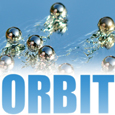
|
||
| Blogs | Digital Reporters at Camp Cardboard | |
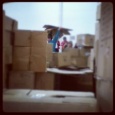
|
Children using iPads to blog about Cardboard Sculptures This activity is a cross curricula(subject) activity, involving a collaborative(tool) approach, giving children the opportunity to work together on a blog. Children were encouraged to engage in group talk(ta) and discussion(ta) in the classroom to reflect on the activity they were to report on. The activity furthers e-skills(topic) and e-safety(topic) through the use of whole class(ta) participation. The specific art activity provided a great stimulus for the blogging. Equally, however, this approach could be applied to any event in or out of school. The use of blogging and social media gave the opportunity for children to share their ideas with a wider audience, and also gave opportunities for real-time feedback to their work. The use of hand-held technology also enabled active learning(ta) as the portability of the iPads and iPods allowed them to be used outside the classroom.
| |
| Blogs | Creating and Using OER to Promote Best Practice | |

|
One school's approach to sharing and promoting best practice using a blog This lesson idea encourages collaboration(ta) between teachers in order to develop and share practice(i) across a school. Blogs provide excellent opportunities for children and adults to share ideas and work together. They encourage and enable dialogue(ta) between a writer - or group of writers - and an audience, allowing for quick and easy feedback. They enable questions(ta) to be asked and answered quickly. This example shows a blog being used to encourage discussion(ta) to enable curriculum planning(topic) and curriculum development(topic).
| |
| CPD | Guide to the DfES Resource | |
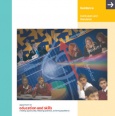
|
Pedagogy and Practice: Teaching and Learning in Secondary Schools: Leadership guide This resource provides a general overview of the DfES Pedagogy resources (see related resources/below).
| |
| CPD | Teaching Models | |

|
Concrete preparation – Action – Metacognition – Bridging - Mediation This resource offers advice on planning(ta) for interactive pedagogy. Three sub-sections have been drawn from it (see related DfE resources).
| |
| CPD | Common Pitfalls in Questioning | |

|
Exploring problematic questions and ways to avoid them Questioning(ta) is a key classroom practice, and skill, and can sometimes fall into the trap of focusing on lower levels, as opposed to higher order(ta) reasoning(ta) and discussion(ta) skills. This resource covers some reasons why this - and other pitfalls - occur, with some practical advice for ensuring high quality questioning in your classroom.
| |
| CPD | Giving Oral Feedback | |

|
Developing good practice in giving oral feedback This resource discusses giving oral feedback, particularly in the context of assessment(ta), which could include whole class(ta) discussion(ta) or group talk(ta), as well as questioning(ta) contexts.
| |
| CPD | Group Work - Group Size | |

|
What size group are we in today? Thinking about group size This resource discusses group work(ta) sizes, and the practical benefits and limitations of various group sizes - from individual work to whole class(ta) work.
| |
| CPD | Group Work - Maintaining Momentum | |

|
Keep going! Maintaining momentum in group work activities This resource discusses some practical classroom management(ta) strategies for maintaining momentum in group work(ta) activities.
| |
| CPD | Using Thinking Skills | |

|
What do you think? Exploring thinking skills for the classroom This resource highlights higher order(ta) reasoning(ta) skills and activities to prompt their use in classroom contexts.
| |
| CPD | Establishing Purpose for Writing | |

|
Why do we have to write it down? Thinking about why we write... This resource highlights some key types of text, and asks teachers to think about the key texts and language(ta) in their own subjects, and how tasks can be well designed to illicit purposeful writing in their classroom practice. Teachers should consider learning objectives(ta) for purposeful writing.
| |
| CPD | Structuring Learning | |

|
Thinking about sequencing and planning for high quality pedagogy The resource includes relevant information regarding lesson and curriculum planning(ta) for high quality pedagogy.
| |
| CPD | Sharing Learning Objectives and Outcomes | |

|
What will they achieve - outcomes, objectives, and their importance This resource highlights the link between learning objectives(ta) and assessment(ta) for learning, and explores ways to engage in planning(ta) for, and write good learning objectives - which identify the learning to take place, as opposed to just the activity with which the pupils will engage.
| |
| CPD | Choosing and Selecting Groups | |

|
What group am I in? Thinking about choosing and selecting groups This resource discusses various options for choosing groupings for group work(ta) activities, and their benefits and limitations.
| |
| CPD | Encouraging Pupils to Ask Effective Questions | |

|
Getting pupils to do the questioning This resource describes some methods to encourage pupils themselves to engage in effective questioning(ta) - an active learning(ta) approach which may be useful in whole class(ta) or group work(ta) discussion(ta).
| |
| CPD | Planning for Inclusion | |

|
Planning for inclusion in your classroom This resource discusses planning(ta) for inclusion(ta), in particular as related to active learning(ta), group talk(ta) and more generally interactive pedagogy.
| |
| CPD | Subject Specific Vocabulary | |

|
What's that word? Thinking about the language used in your subject This resource highlights the importance of subject-specific vocabulary(ta) and its consideration in teaching as well as offering some practical tips for encouraging its effective use, and remembering in classroom contexts.
| |
| CPD | Questioning Techniques | |

|
How do I question? Thinking about questioning techniques in the classroom This resource explores some alternative strategies to direct questioning(ta) including some advice and activities for supporting teachers in classroom practice.
| |
| CPD | Giving Written Feedback | |

|
Effective methods for written feedback This resource discusses written feedback in the context of assessment(ta) and giving clear learning objectives(ta) from any feedback given. While such feedback is often on homework(ta), the resource is intended more broadly than that.
| |
| CPD | Using Drama Activities in your Teaching | |

|
A lesson by any other name...Using Drama across the curriculum to enhance teaching This resource highlights some strategies to use drama(ta) activities in the teaching of other subjects. Drama(ta) can provide a useful cross curricula(i) way to prompt active learning(ta) and subsequent discussion(ta) and group talk(ta).
| |
| CPD | Questioning - Bloom's Taxonomy | |

|
Developing questioning through Bloom's taxonomy This resource discusses questioning(ta) and Bloom's taxonomy - which, at the higher levels, can be linked to higher order(ta) thinking skills and reasoning(ta).
| |
| CPD | Developing Good Explanations | |

|
Say that again? Developing good explanations for classroom teaching This resource explores some characteristics of good explanations (including linking to questioning(ta)), explaining these thoroughly and linking them to pupils' ability to engage in active learning(ta)
| |
| CPD | Teaching for Metacognition | |

|
Thinking about Thinking, in the classroom context This resource describes some strategies to engage metacognitive reasoning(ta) - thinking about thinking, for example, asking pupils to think about their own learning techniques. It includes activities to assist teachers in planning(ta) for their own teaching.
| |
| Collaborative writing | Collaborative writing with EtherPad | |

|
||
| Consecutive Sums | Using Prime and Square Numbers - How Old Am I? | |
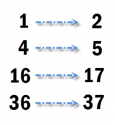
|
Last year I was square, but this year I am in my prime. How old am I? This short activity offers opportunity for pupils to engage in mathematical thinking(ta) and higher order(ta) problem solving/reasoning(ta). They should be able to make links between different areas of mathematics and explore their ideas in whole class(ta) discussion(ta) and questioning(ta).
| |
| Contemporary issues | Teaching the Science of Contemporary Issues | |
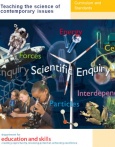
|
Find lesson inspiration aplenty from news clips and stories. This longer (32 page) resource provides useful guidance, examples, and CPD activities for exploring contemporary issues in science, particularly to stimulate effective group talk(ta) and discussion(ta), and provoke pupil's interest in science.
| |
| Creativity | Exploring the intersections of digital literacy and creativity | |

|
A DEFT case study with Mundella Primary School, Sheffield This cross curricula(i) case study focusses on Digital Literacy, in particular using E-skills(topic) to: extend/update teaching skills and support CPD and explore the creative potential of digital technologies. The case study examines the potential of using mobile technologies to enhance creative aspects of learning.
One of the lesson ideas from the case study is available as a separate resource at Creating Digital Paintings using iPads | |
| Differentiation | Differentiation | |

|
Developing effective techniques for differentiation by task and outcome The small group work(ta) nature of this task allows teachers to share ideas, and attempt to conceptualise two different types of differentiation(ta), together. It also encourages teachers to share practice(i)s in differentiation. Teachers are first asked to consider differentiation ‘by task’ by thinking about self-sustaining activities which pupils could manage with little support. They are also asked to consider differentiation by outcome, and ‘hierarchies of achievement’ for particular topics. The practical nature of the task offers a concrete outcome for teachers to take away and use in their practice both day to day, and in curriculum planning(topic). The resource could be used as a prompt to start teachers off, a comparator for teachers working on similar topics, or just as an additional set of possibilities.
| |
| Digital Art | Creating Digital Painting using iPads | |

|
Children using iPads to create observational drawings of flowers This activity is a cross-curricular(subject) activity, that gives children to opportunity to work independently on an art activity that also encourages the development of E-skills(topic). This activity encouraged inclusion(ta) as the children's final work was displayed as a collaborative(tool) piece, where all children had the opportunity to make an equal contribution.
In this instance, the children created observational drawings of flowers. However, the subject of the art could change to fit with any topic across the curriculum. The use of hand-held technology could also active learning(ta) as the portability of the iPads and iPods would allow them to be used outside the classroom, thus enabling observational drawings to be made in a range of locations. | |
| Digital Media | 21st century show and tell | |
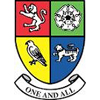
|
A DEFT case study with Dinnington Comprehensive, Rotherham This cross curricula(i) case study focusses on Digital Literacy, in particular using E-skills(i) to: support skills in writing/recording for a target audience and to improve communication and research skills through the process of creating OER(i)s. The case study illustrates issues involved in the use of video(i) for educational purposes, with an emphasis on students producing and releasing OERs. The method could also be used for self/peer assessment(i) with pupils.
One of the lesson ideas from the case study is available as a separate resource at Creating Instructional Videos. | |
| Discussion | The Environment for Group Talk in Science | |

|
"Ask questions rather than provide answers: ‘What’s the strength of his or her point?’ ‘How you could check that out?’ " This resource contains a set of activities and examples to discuss and work through based around maintaining group talk(ta) in whole class(ta) and group work(ta) settings, including setting up Ground Rules, and creating appropriate environments (physical and 'class rule' based) for argumentation(ta) and discussion(ta)
| |
| Discussion | Discussion in Science Teaching | |

|
Equip yourself to run a discussion in class This resource is aimed at developing student teachers’ skills in working with discussion(ta). It can be presented to them as a hand-out to accompany an activity or read as reference material. See it online at BEEP website. Although it uses a science context, the real focus of the resource is managing and organising discussion-based activities. It provides guidance on:
| |
| Effective Learning | Developing Effective Learning | |

|
A unit exploring 'effective learning' in the classroom This document takes a longer look at effective learning, study skills(topic), and the attributes of effective learners.
| |
| Environment | Our Living Environment | |

|
Wise up on ecology This study module, an online booklet, deals with the particular ways of thinking about and studying of the environment. It is a useful homework(ta) resource to encourage pupils to engage with key scientific vocabulary(ta) and use their knowledge of the scientific method(ta) to engage with inquiry(ta) learning.
| |
| Ethics | Cloning | |

|
Cloning - Potential and Issues The topic of the ethics(topic) of modern biology needs to draw on a wider range of sources than a printed book may provide. This resource uses a web tutorial interspersed with external links to news and comment. Rather than leave the students to explore too many interests, a worksheet with questions enables the teacher to focus the students on a subset of the material. You can adapt this to your particular need, for example, if you wanted students to have a discussion(ta)in small groups. You might also consider using a blog, chat room or other ICT tools to record the questioning(ta) and reasoning(ta) around this topic. The lesson-planning proforma (or draft lesson plan) includes a list of objectives that shows the scope of the material.
| |
| Ethics | Designer Babies | |
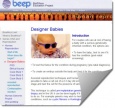
|
When does life actually begin? By using an informative web tutorial, this resource aims to stimulate discussion(ta) on the ethics(topic) of modern biology. A worksheet asks students where they stand and reassures them that their response might be kept private. You might also consider using a blog, chat room or other ICT tool to record the questioning(ta) and reasoning(ta) around this topic. A teaching section offers guidance on 'teaching argument' using 'Toulmin’s model of argument' and 'The IDEAS project'.
| |
Click here to view further results.The part "{{{1}}}" of the query was not understood.</br>Results might not be as expected.

